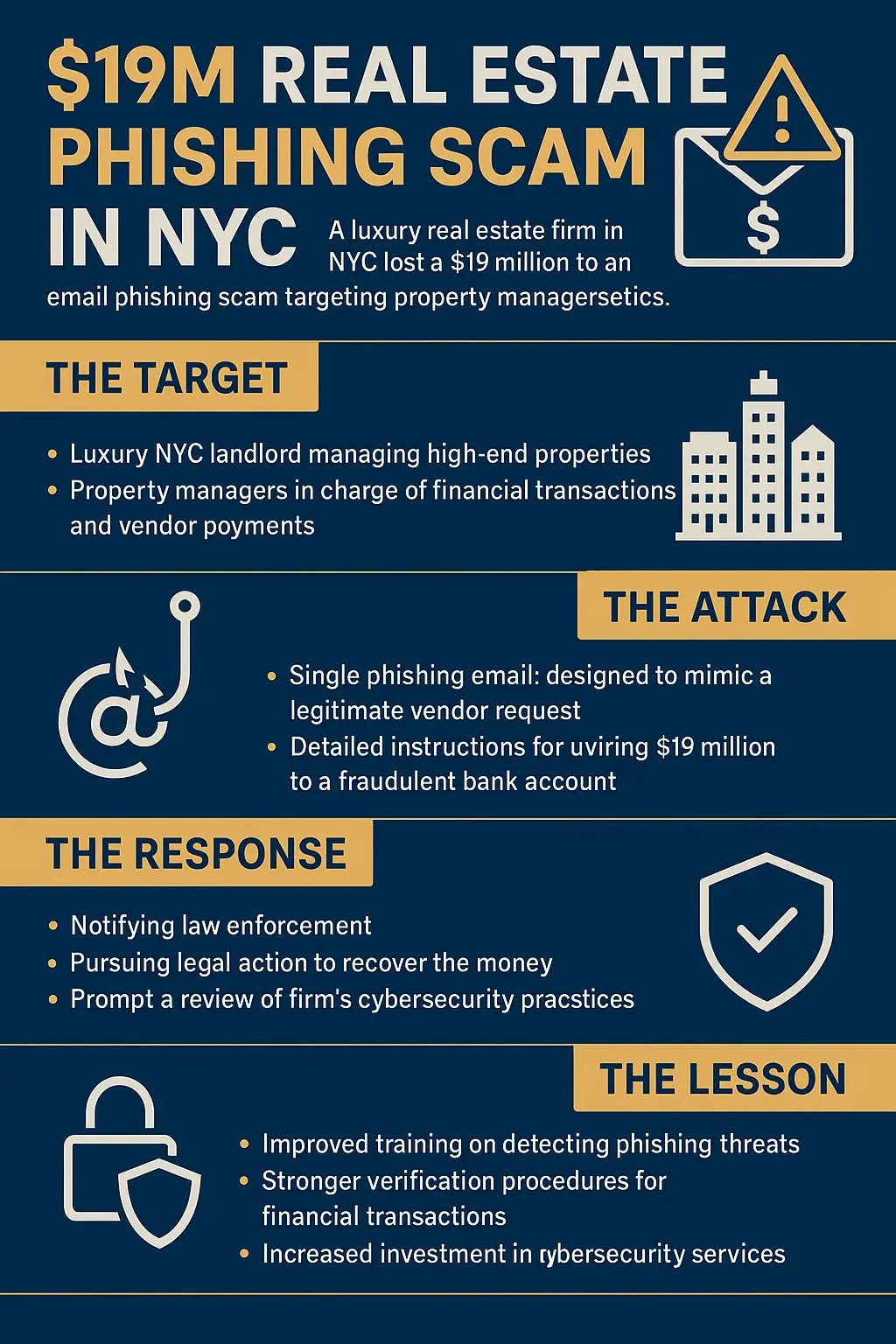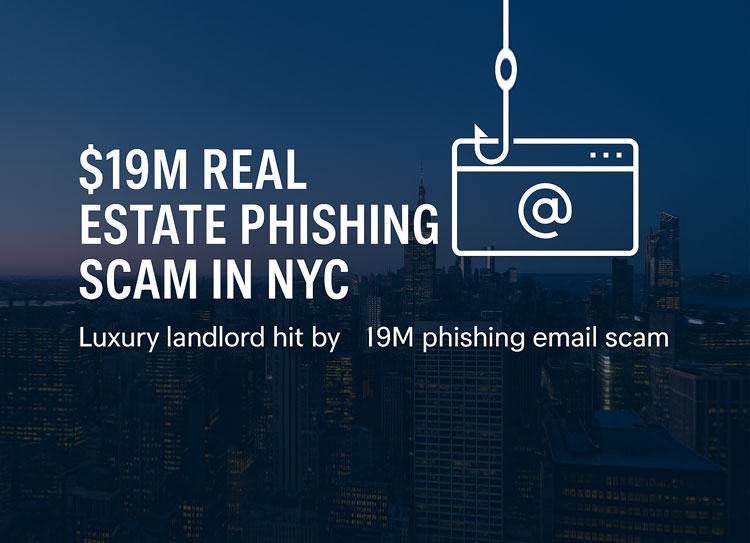$19M Real Estate Phishing Scam in NYC: A Wake-Up Call for the Property Industry
Imagine overseeing millions of dollars’ worth of luxury real estate in the heart of New York City. Deals close daily, payments move across digital wires, and trust is placed in every transaction. Then, with a single click on a carefully disguised email, $19 million vanishes—gone, almost instantly.
That nightmare became reality in August 2025 when a prominent property management firm in NYC fell victim to a sophisticated phishing scam. The attack didn’t just expose vulnerabilities in one company—it revealed how the entire real estate industry remains dangerously exposed to cybercrime.
This is the story of how a $19M phishing scam hit NYC property managers, why luxury landlords are now scrambling for answers, and the urgent cybersecurity lessons every business must take seriously.

The Anatomy of the Scam
The incident began like many cybercrimes: quietly, invisibly, and with an email that looked completely routine. According to initial reports, a luxury NYC landlord was hit by a $19M phishing email scam that impersonated a trusted vendor.
Step 1: Reconnaissance
Cybercriminals didn’t randomly pick their target. They studied the property management firm’s vendors, email styles, and financial transaction processes. Weeks, if not months, of careful research went into understanding how the company handled money transfers.
Step 2: The Phishing Email
The criminals crafted an email that appeared to come from a legitimate vendor. The domain name was nearly identical, the logo was copied perfectly, and the tone matched the vendor’s usual correspondence.
Inside the email, the attackers requested a wire transfer of funds—something that happens regularly in large-scale real estate transactions. The request was urgent, convincing, and backed up with fake documents that looked authentic.
Step 3: The Transfer
Trusting the communication, the firm authorized a transfer of $19 million to what they believed was their vendor’s account. By the time suspicions arose, the money had already been dispersed through a web of international accounts. Recovering it was nearly impossible.
Why Real Estate Is a Prime Target
The scam wasn’t random. Real estate, particularly luxury NYC properties, has become one of the most attractive targets for cybercriminals.
- High-Value Transactions
Real estate deals often involve millions, making even a single successful scam extraordinarily profitable. - Multiple Parties Involved
Brokers, lawyers, vendors, and managers all communicate via email. This creates multiple entry points for fraudsters. - Reliance on Email Communication
Despite cybersecurity awareness, many real estate professionals still depend heavily on email for critical financial instructions. - Time Pressure
Deals are often urgent, which makes staff more likely to act quickly and skip verification steps.
In this case, the attackers leveraged all four vulnerabilities.
The Fallout: $19 Million Gone
The immediate consequence was staggering: a NYC firm loses $19M to phishing email scam in what is now being described as one of the largest real estate cybercrimes in U.S. history.
Reputational Damage
For a luxury landlord handling high-profile clients, trust is everything. The revelation of such a breach rattled tenants, investors, and partners alike.
Legal and Financial Consequences
While law enforcement is involved, recovering stolen funds routed through international banking systems is notoriously difficult. Lawsuits from investors and clients could compound the financial damage.
Industry-Wide Shockwaves
News spread quickly. Real estate firms across the country began scrambling to review their own cybersecurity measures. If such a sophisticated firm could be duped, who’s truly safe?
How One Email Took Down Millions
To the untrained eye, the phishing email would have looked completely normal. That’s the frightening part.
- Sender Domain: Off by a single character (e.g., replacing “.com” with “.co”).
- Attachments: Included forged invoices that matched the vendor’s previous layouts.
- Language: Carefully mimicked the vendor’s professional tone and urgency.
- Timing: Sent during a peak period when the finance team was processing multiple payments.
Even trained professionals can fall prey to such precision.
Voices from the Cybersecurity Community
Cybersecurity experts are not surprised. One professional from a cybersecurity services firm explained:
“Phishing has evolved far beyond those crude ‘Nigerian prince’ emails. Today’s attacks are personalized, well-researched, and almost indistinguishable from legitimate communication. Without multi-layered defenses, even the most cautious employee can be tricked.”
Another noted that this scam highlights a major industry flaw: the overreliance on email verification without secondary validation channels.
Lessons for Businesses
Every industry can learn from this $19M real estate phishing scam in NYC. Here are the top takeaways:
- Implement Multi-Factor Verification
Any financial transaction request should require multiple approvals, ideally confirmed through different channels (phone call, secure portal, etc.). - Regular Cybersecurity Training
Staff must be trained to spot subtle red flags in emails—slight domain changes, unusual urgency, or altered bank account numbers. - Deploy Advanced Cybersecurity Services
Email filtering, AI-driven anomaly detection, and real-time threat monitoring could have flagged the suspicious communication. - Zero-Trust Policies
Organizations should adopt “trust no one” frameworks, where every transaction is verified regardless of the source. - Incident Response Plans
The speed of reporting can mean the difference between recovering funds and losing them forever.
A Human Story Behind the Numbers
While headlines focus on the $19M phishing scam hits NYC property managers, it’s important to remember the people affected.
- Employees who unknowingly facilitated the transfer now face scrutiny and guilt.
- Clients who trusted the landlord with their money and homes feel betrayed.
- The firm’s leadership must navigate both financial disaster and public embarrassment.
This isn’t just about dollars—it’s about trust, credibility, and livelihoods.
A Wake-Up Call for the Real Estate Sector
The luxury property market in New York is known for opulence, prestige, and fast-paced deals. Yet beneath the glittering skyline lies a digital infrastructure that is surprisingly fragile.
This breach is a stark reminder that even billion-dollar assets can crumble with a single mouse click. For property managers, brokers, and landlords, investing in cybersecurity services is no longer optional—it’s essential for survival.
Looking Forward
Authorities are investigating, and industry associations are urging firms to review their defenses. Some speculate that insurers will tighten requirements for cybersecurity before offering liability coverage for real estate transactions.
Meanwhile, competitors are rushing to reassure their clients with stronger security guarantees.
This may mark a turning point for the industry: a shift from treating cybersecurity as an afterthought to making it a cornerstone of property management.
Conclusion: The $19M Lesson
The luxury NYC landlord hit by $19M phishing email scam has learned a devastating lesson: in today’s world, the most expensive square foot in New York City may not be a penthouse suite—it’s the inbox.
For every real estate firm, whether managing skyscrapers in Manhattan or small offices in North Carolina, the message is clear: cybersecurity is real estate security.
Don’t wait for a phishing email to teach that lesson the hard way.

